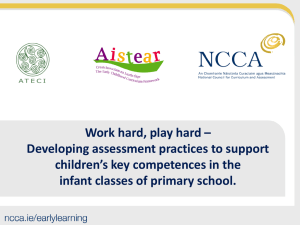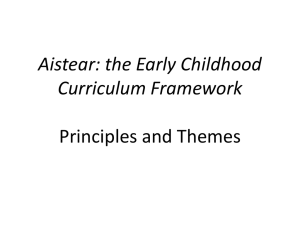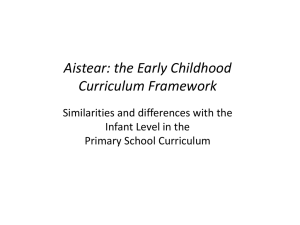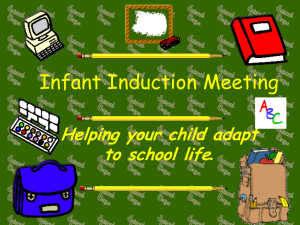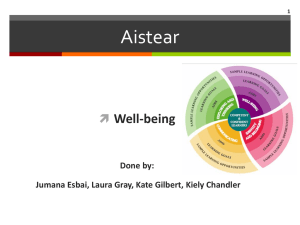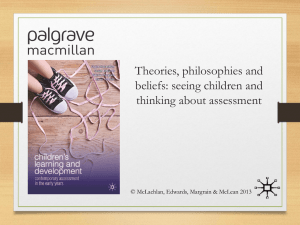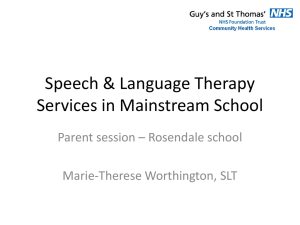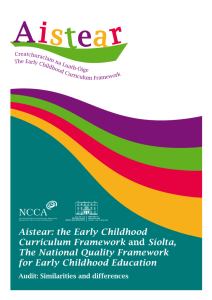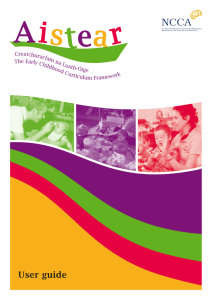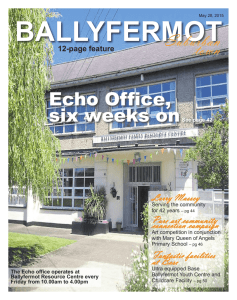Early Years Language and Learning Initiative - Ballyfermot
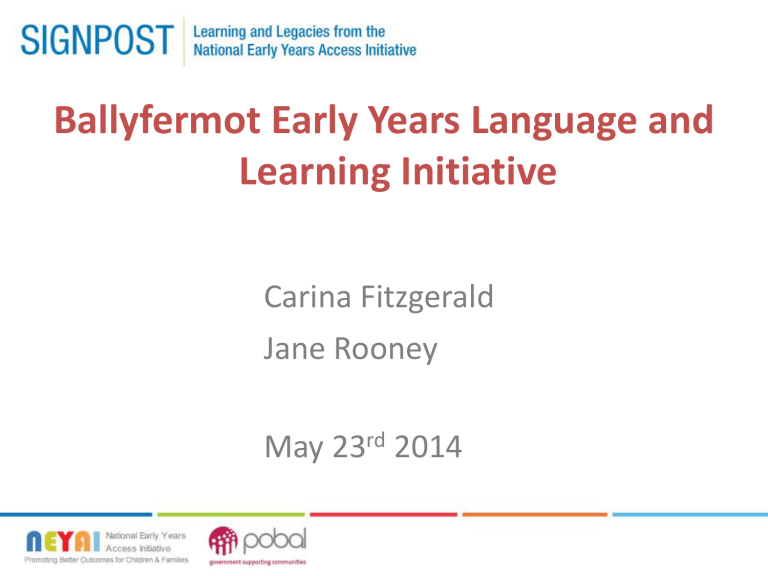
Ballyfermot Early Years Language and
Learning Initiative
Carina Fitzgerald
Jane Rooney
May 23
rd
2014
Ballyfermot Consortium Area
7 Primary Schools, junior and senior infant classes
2 Early Starts, 3 pre-schools
10 crèches/childcare services/play groups
1222 children
162 early years educators (including 30 infant teachers)
135 parents (so far)
Two Broad Strands to the Project
• Aistear Training
• Language Enrichment
Aistear Workshops
Joint training - workshops comprise educators from early years services and primary schools
Workshops co-facilitated by an early childhood specialist and a primary teacher - Aistear specialist who has Aistear implemented in her classroom
2 hours per week for 6 weeks, held in local schools
13 Cluster groups over 2 years, 18-25 participants in each group (250+ participants in total)
Everyone in Ballyfermot working with children from 0 –
6 has attended (+ others)
Aistear Workshops
Challenge of bringing teachers and early years staff together and making the workshops relevant to both
Very positive feedback and outcomes - Aistear is now implemented in all infant classes in Ballyfermot and being further embedded into Early Years services
One to one follow up visits to all settings from tutors, helped embed the training and gave support
NEYAI funded some equipment to set up Aistear in the schools (Jaggo blocks)
A Transitions workshop took place in November 2013 – attended by primary teachers and pre-school practitioners – with a view to implementing an area wide transitions policy in 2014. Child snap- shot form was piloted by many centres in June 2013 and will be implemented area-wide this year
A follow up workshop on documenting Aistear also took place for Early Years
Educators
Aistear Workshops – Ancillary Evaluation
An Evaluation was completed by Dr Glenda Walsh, Dr. Dorothy McMillian and Dr.
Andrea Doherty from Stranmillis University Belfast. Findings include:
The shared aspect was an integral feature of the training and the majority perceived this inclusive experience as principally positive. Participants identified the development of relationships and the enhanced mutual respect and recognition for one another as a success of the shared training approach. The newly-formed relationships were described as beneficial not only for adults, but also for children, due to the promotion of continuity across settings and due to the enriched teamwork.
Most of the participants reported positively on how the course had changed aspects of daily practice in terms of room layout and play areas provided, the use of more appropriate pedagogical strategies to ensure effective learning through play, greater engagement in reflective practice and the enhanced profile ascribed to play in their setting/classroom context in terms of more time and value.
The training seemed to impact greatly on primary teachers’ perceptions of the importance and value of the Aistear framework for young children’s learning and development.
Aistear Workshops – Ancillary Evaluation
Recommendations include:
Continue to provide shared training experiences that attract both early years sectors
Offer adequate challenge within the training to cater for the variety of needs and levels of understanding by providing breakout groups and greater choice on the part of the participants.
Create opportunities to see Aistear in practice in a typical early years setting/class with typical young children, while the children are present and engaged in play.
Ensure better consistency of delivery and content between the different training programmes.
Provide opportunities for participants to have some influence on the course content.
Ensure that further training is provided to build on some of the issues addressed within the Ballyfermot Aistear Training to target more directly issues such as documentation, observation and assessment
Language Enrichment
Parent and child educational sessions called “Chatter Matters” which focussed on the development of early communication followed by shared activity with the children.
A ‘Listening Group’ which was created for a small group of children with the early years educators.
This group was delivered immediately after the Chatter Matters group and was for approximately one hour per week over eight weeks.
Three Teacher Talk training sessions (based on the Hanen Programme) and follow up video sessions over one year with early childhood educators.
Training in Speech and Language Support for under 5’s and over 5’s – based on Elklan
Chatter Matters - Language Enrichment Groups
A Senior Speech and Language Therapist(SLT) was contracted to deliver Chatter
Matters workshops to parents, their children and staff
The programme involved 1 hour with parents and children over 8 weeks
It involved sharing information and resources around early communication development, especially attention and listening, vocabulary, using sentences, story telling and conversations. Parents can repeat the games etc at home.
Another aim was for staff to learn the skills so they can re-run the programme, thereby ensuring sustainability
10 centres completed the programme with very positive feedback
So far 6 of the 10 centres have re-run Chatter Matters themselves with positive feedback from parents
Listening Groups
• While in the centre the Speech and Language Therapist followed
Chatter Matters by a half-hour listening circle with a smaller group of children. Staff run the listening group or use listening group methodology throughout the week, at small group time, planning time etc
STOP
LOOK
LISTEN
Listening Groups
Run for approx 30 mins over 8 weeks.
Goal is to model and show children how to:-
» Sit
» Look
» Listen
» Think and
» Take turns
Similar routine for each session with a themed topic for vocabulary each week.
Speech and Language Training
3 days of Hanen’s Teacher Talk training followed by a video session/feedback with each participant after each training day
The first day of Teacher Talk training focused on different styles of communication with children and introduced staff to the strategy of Observe, Wait, Listen (OWL)
The second day linked language and literacy through story-reading, particularly ‘dialogic reading’, which is having a dialogue with children about the story
The third day focussed on peer interaction between children, encouraging children to interact with each other.
Following each training day, the SLT had a one-hour session with each member of staff. During this session, the SLT video-recorded each staff member interacting with children in her usual work setting. Each staff member was then invited to watch the video and to assess her practice; she was then offered feedback and analysis by the SLT based on the video
2 rounds of this training were completed over 2012 and 2013
Speech and Language Training
Identification of Speech and Language Difficulties and Providing
Resources for Educators – based on Elklan
Training in Speech and Language Support for under 5’s – a 2 day course was run twice in Summer 2013 with 22 participants on each course
A summer course for teachers(5 days) - Speech and Language Support for 5 –
11 Year Olds - held in July 2013, full cohort of 25 participants
A recent one days course for teachers – fully subscribed 23 participants
Excellent feedback from all Training Courses
Language Enrichment – Ancillary Evaluation
A Evaluation report “Let Then Talk” was completed by Dr. Geraldine French, Early
Childhood Education Specialist. The findings include:
The Programme had a significant and positive impact on the quality of the educators’ interactions and on the settings
Improvements in providing space, time and opportunity for children to articulate their thoughts, ideas, and language, described as “let them talk” by one participant, was frequently referenced by the respondents as a significant impact of the Programme on their interactions. This in turn was highly influenced by the process of ‘observe, wait and listen’
The success of the Programme was due to the engagement of the managers as well as the dispositions and readiness of staff, the quality of the in-service training and onsite mentoring support. The SLT was particularly skilled with expertise to model the required strategies onsite; to suggest and encourage practice of new approaches and to pick up on the language issues of the children. The use of videos and the process of self-evaluation and video-feedback with staff also appeared to be particularly useful.
“Let Them Talk” – Ancillary Evaluation
A significant and positive impact was had on the overall quality of the settings, in particular: the learning environment (which includes attention to literacy and numeracy), the daily routine and adult child interactions.
The scores on adult-child interaction demonstrated improvements in: o support for child communication o encouragement of child initiatives o support for child learning at group times o opportunities for child exploration o encouragement for peer interaction o independent problem solving
In relation to the Literacy and Numeracy Indicator positive findings were recorded on the dimensions of environmental print, book and literacy areas, reading stories, emergent writing, counting, shape and space and simple numbers
“ Let Them Talk” – Ancillary Evaluation
Policy Recommendations
Arising from the positive findings the Ballyfermot Programme could be a model for the preschool mentoring programme. Elements of that mentoring could include: a focus on content knowledge; active participation of educators in the learning process; coherence with other training – all training to be underpinned by the same principles and theoretical base( Aistear and Síolta); the collective participation of educators from the same setting, including the manager - as a result it is more likely that systemic change in practice may be promoted over time; a continuous programme of intervention;
Finally and perhaps most importantly, on-site mentoring using video analysis and immediate strengths-based feedback locating opportunities for professional development within an educators’ regular work day approaches such as the Ballyfermot Language Enrichment Programme should be replicated in all early childhood settings in Ireland, particularly those in areas designated as disadvantaged.
“Let Them Talk” - Ancillary Evaluation
Practice Recommendations
The Ballyfermot Language Enrichment Programme (and indeed Aistear training and HighScope training) be consolidated and reinforced in practice.
Any training that is offered should focus on Language Enrichment Programme refreshers as opposed to taking on something new
All learning experiences offered by early childhood settings should support speech, language and communication development to children
The work of SLTs should involve engaging in early childhood educator training programmes such as the
Ballyfermot Programme in all early childhood settings. Every child can benefit from the ideas shared not just children identified as having language delay or unclear speech
The importance of early literacy seems to have been realised in practice in the settings. However, since early numerical skills not only predict later abilities in numeracy, but also predict later abilities in literacy, equal attention should be paid to early numeracy.
The participants who engaged in the Ballyfermot Programme appear to have absorbed the messages in relation to reading stories dialogically with children. It is recommended that educators take these principles and apply them in pursuing children’s topic of interest in conversation throughout the day.
Sustainability
Schools and Early Years settings now running Chatter Matters themselves
Anne-Marie Aberg Principal SLT with HSE in Cherry Orchard will support the initiative post NEYAI
For the final Chatter Matters group run by Tricia Curtis(SLT) a SLT from HSE shadowed Tricia, with a view to supporting Chatter Matters in the future
Twice yearly support meetings for those delivering Chatter Matters with HSE SLT in attendance
Tricia worked in other settings to support them to embed the training and to give on-site delivery of resources for Early Communication ad Development
Aistear now up and running in all schools and early years settings – one Aistear course each year to be run to cater for new staff and for those who want to refresh
An early years educator from the community was trained in Aistear with a view to delivering the training in the future alongside the teacher from St. Louise’s school
